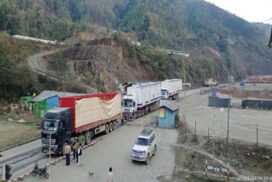The value of Myanmar’s bilateral trade with the neighbouring country Thailand through land borders registered a significant increase of US$365.7 million between 1 April and 21 October of the current financial year 2022-2023 as against a year-ago period, the statistics issued by the Ministry of Commerce indicated.
The ministry reported that exports surpassed imports in trade with Thailand in nearly seven months, with exports reaching over $1.98 billion and imports valued at over $934.33 million, totalling $2.9 billion. During the corresponding period last year, Myanmar-Thailand border trade amounted to $2.55 billion.
There are seven border posts between Myanmar and Thailand-Tachilek, Myawady, Kawthoung, Hteekhee, Myeik, Mawtaung and Maese. Except for Tachilek and Hteekhee border posts, the trade through Myawady, Kawthoung, Myeik and Mawtaung declined against that of last year. The value of border trade stood at $87.07 million via Tachilek, $1.267 billion via Myawady, $112 million via Kawthoung, $61.136 million via Myeik, $1.38 billion via Hteekhee and $5.615 million via Mawtaung. The Maese border post has not seen trade yet.
Myanmar exports corn to Thailand through the Myawady and Tachilek land border. Thailand gives green light to corn imports under zero tariff (with Form-D), between 1 February and 31 August.
The use of Baht-Kyat in bilateral transactions also resulted in trade facilitation. Nonetheless, the directive released on 30 June said that transactions for the exports of agricultural products including corn, rice, bean and oil crops are to be made in dollars instead of Yuan-Kyat/Baht-Kyat direct payment for border trade settlement.
Therefore, the export earnings of the corn have to be exchanged for the US dollar according to the reference rate of the Central Bank of Myanmar – K2,100. Nonetheless, there is a large gap between the regulated rate and the unauthorized rate of the US dollar.
Additionally, exports of natural gas through Hteekhee in the Taninthayi Region contributed to the enormous increase in border trade with Thailand.
Moreover, the changes in import policy inflated the commodity prices, along with Kyat weakening against the foreign currencies in the local forex market. Starting from 1 May of the current financial year 2022-2023, food products and commodity prices are no longer exempt from import licences. Yet, a red tape could spark the smuggling of goods and it could result in revenue loss for the State, said a trader involved in Myawady cross-border trade. Myanmar primarily exports natural gas, fishery products, coal, tin concentrate (SN 71.58 per cent), coconut (fresh and dry), beans, and bamboo shoots to Thailand. It imports capital goods such as machinery, raw industrial goods such as cement and fertilizers, and consumer goods such as cosmetics and food products from the neighbouring country. — KK/GNLM
Myanmar-Thailand border trade surges by $365.7 mln as of 21 Oct
- November 02, 2022
- 1200













